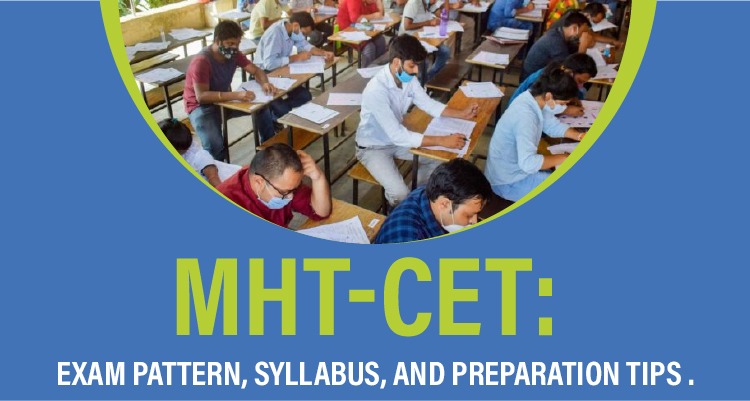Blog
- home
- Blog Single

MHT-CET: Exam Pattern, Syllabus, and Preparation Tips.
Introduction
Maharashtra Common Entrance Test (MHT-CET) is a state-level entrance exam conducted for admissions into various undergraduate programs in engineering, pharmacy, and agriculture colleges in Maharashtra. If you're aspiring to pursue a career in these fields, it is essential to have a comprehensive understanding of the MHT-CET exam pattern, syllabus, and effective preparation strategies. In this blog, we will delve into these aspects and provide you with valuable tips to excel in the MHT-CET examination.
Exam Pattern
The MHT-CET exam comprises multiple-choice questions (MCQs) and is conducted in an offline (pen and paper) mode. The exam is divided into three sections, namely Physics, Chemistry, and Mathematics/Biology. The duration of the exam is 3 hours, with each section carrying equal weightage.
For engineering aspirants, the exam consists of 150 questions, with 50 questions from each subject (Physics, Chemistry, and Mathematics). Each correct answer is awarded one mark, while there is no negative marking for incorrect responses. The exam carries 150 points in total.
For pharmacy and agriculture courses, the exam includes 200 questions, with 50 questions each from Physics, Chemistry, Mathematics/Biology, and an additional 50 questions from the subject of Biology. The total marks for this variant of the exam are 200.
Syllabus
To prepare effectively for MHT-CET, it is crucial to be familiar with the syllabus. The syllabus for the MHT-CET exam is based on the Maharashtra State Board of Secondary and Higher Secondary Education (MSBSHSE) curriculum for Class 11 and Class 12. The syllabus is broken down into the following subjects:
Physics:
Measurements
Scalars and Vectors
Force
Friction in Solids and Liquids
Refraction of Light
Ray Optics
Magnetic Effects of Electric Current
Electromagnetic Induction
Atoms, Molecules, and Nuclei
Semiconductors, etc.
Chemistry:
Some Basic Concepts of Chemistry
States of Matter: Gases and Liquids
Redox Reactions
Surface Chemistry
Basic Principles and Techniques in Organic Chemistry
Hydrocarbons
Solutions and Colligative Properties
Chemical Thermodynamics
Chemical Kinetics
Biomolecules, etc.
Mathematics:
Sets, Relations, and Functions
Trigonometric Functions
Mathematical Reasoning
Matrices and Determinants
Continuity and Differentiability
Applications of Derivatives
Integrals
Probability
Vectors, etc.
Preparation Tips
Understand the Exam Pattern: Familiarise yourself with the exam pattern and syllabus to know what to expect in the exam. This understanding will help you plan your preparation strategy accordingly.
Create a Study Schedule: Develop a well-structured study plan that covers all the topics in the syllabus. Set up particular time slots for each subject, and make sure to stick to the timetable.
Study Material and Resources: Gather the necessary study material, including textbooks, reference books, and previous years' question papers. Utilise online resources, such as video lectures and educational websites, to supplement your learning.
Practice Regularly: Practice is the key to success. Solve a wide variety of practice questions and sample papers to improve your problem-solving skills and speed. Additionally, take practice exams to evaluate your performance and imitate the exam experience.
Time Management: Learn effective time management techniques to ensure you can complete the exam within the given time frame. During practice sessions, set time limits for each section to enhance your speed and accuracy.
